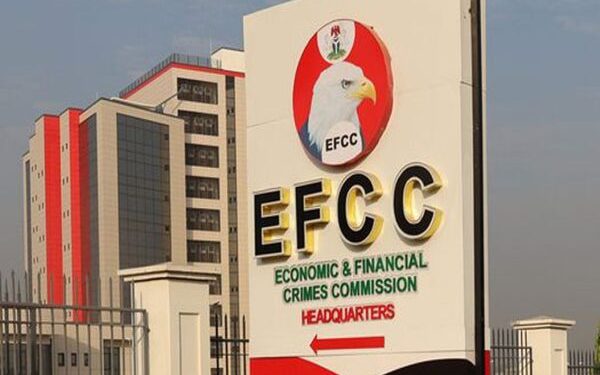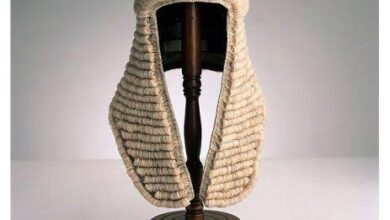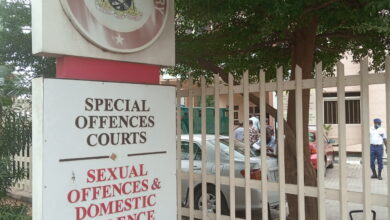
The current Chairman of the Economic and Financial Crimes Commission (EFCC), Olanipekun Olukoyede, and the commission’s pioneer head, Nuhu Ribadu, share a commitment to fighting corruption in Nigeria, though they come from different backgrounds.
One notable difference is that Olukoyede was never a police officer, while Ribadu was.
Both are accomplished lawyers who have dedicated their expertise to the anti-corruption effort in Nigeria, but they have operated in different contexts—Ribadu in an analogue era and Olukoyede in today’s digital age.
Ribadu’s nomination and subsequent approval by the National Assembly faced significant resistance from police circles, especially during the tenure of then-Inspector General of Police Tafa Balogun.
Despite the challenges, Ribadu successfully prosecuted Balogun, recovering approximately €150 million that had been embezzled.
This landmark case was highlighted by dramatic media coverage, including photos of Balogun being dragged away. In today’s digital landscape, such an event would likely go viral on social media, which Ribadu may not have been able to withstand given the prevalence of fake news.
Balogun attempted to generate public sympathy against Ribadu, similar to how former Kogi State Governor Yahaya Bello created a scene during a visit to the EFCC office.
You May Like To Read: Yahaya Bello Saga: Presidency Says Tinubu is Approaching the Fight Against Corruption Differently
Although Olukoyede did not arrest Bello, the incident still generated significant media attention.
Learning from the past, Olukoyede has displayed a professional demeanour, navigating the challenges posed by opportunistic politicians who aim to undermine his efforts.
While Ribadu’s achievements at the EFCC are vast, there are indications that Olukoyede is establishing a new framework for combatting corruption without resorting to humiliating tactics.
Critics, however, perceive Olukoyede’s civility as a weakness in his fight against those who misappropriate public funds. Despite significant pressure to remove Ribadu, former President Olusegun Obasanjo ultimately reappointed him in 2007 in recognition of his successful tenure.
However, Ribadu later faced political opposition that led to his dismissal from the police force. He left with dignity and went into exile to further his studies.
Before calling for Olukoyede’s removal and potentially forcing him into exile, we should scrutinize the integrity of those making such demands, examining their track records and motives to undermine the EFCC.
Moreover, we need to consider Olukoyede’s professional background and the methods he’s employed to hold corrupt individuals accountable.
Read Also: $1.6m Fraud: Nigeria Special Offences Court Sentences American Businessman To 74yrs Imprisonment
Having worked in the chambers of former Vice President Yemi Osinbajo and previously serving as the Secretary to the EFCC, Olukoyede is well-equipped for his role and is subject to transparent public scrutiny—qualities that make him a valuable asset to Nigeria’s foremost anti-graft agency.
His steadfast approach has brought him challenges similar to those faced by Ribadu, who rejected a $15 million bribe and a house abroad, instead reporting the offer to the Central Bank of Nigeria, using the evidence against the corrupt governor in court.
Today, as Olukoyede navigates various legal challenges involving the former Governor of the Central Bank, Godwin Emefiele, he faces attempts to undermine his authority. Rather than giving in to these pressures, he has invited the governor to discuss matters in his office, demonstrating his commitment to integrity.
Olukoyede, who is both a lawyer and a pastor, exemplifies a robust stance against corruption during this challenging period in our nation. While it may be argued that not all pastors or lawyers possess integrity, it is noteworthy that no one has been able to identify any corrupt dealings or properties owned by Olukoyede, unlike some of his predecessors.
Before we contemplate sending him into exile, we should remember Ribadu’s return from exile, which elevated his public standing and led him to pursue a political career, including gubernatorial and presidential candidacies. Currently, Ribadu serves as the National Security Adviser in President Bola Tinubu’s cabinet, and it’s plausible that Olukoyede could emerge as a significant political figure in the future, based on his integrity and effectiveness.
Meanwhile, Olukoyede has much more to contribute to the EFCC.







